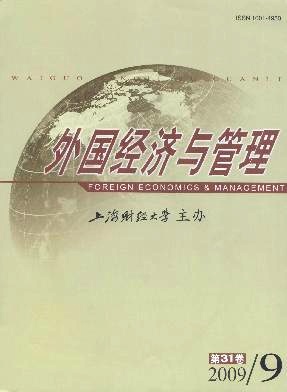商业性朋友关系研究述评
外国经济与管理 2009 年 第 31 卷第 09 期, 页码:60 - 65
摘要
参考文献
摘要
商业性朋友关系是组织间关系的一个重要部分,这方面的研究尚属空白。基于此,本文将商业性朋友关系研究从纷繁芜杂的传统关系研究中剥离出来,从商业性朋友关系的特质、建构、形成机制和测量四个方面来研究商业性朋友关系,以期为后续理论建构和经验分析创造必要的条件,并为国内的商业性朋友关系研究提供一些启示。
[1]Grayson,Kent.Friendship versus business in marketing relationships[J].Journal of Marketing,2007,71(4):121-139.
[2]Ingram,Paul,and Roberts,Peter W.Friendships among competitors in the Sydney hotel industry[J].American Journal of Sociolo-gy,2000,106(2):387-423.
[3]Johnson,Michael D,and Selnes,Fred.Customer portfolio management:Toward a dynamic theory of exchange relationships[J].Journal of Marketing,2004,68(2):1-17.
[4]Heide,Jan B,and Wathne,Kenneth H.Friends,businesspeople,and relationship roles:A conceptual framework and a research a-genda[J].Journal of Marketing,2006,70(3):90-103.
[5]Halpern,Jennifer J.Elements of a script for friendship in transactions[J].Journal of Conflict Resolution,1997,41(6):835-868.
[6]Uzzi,Brian.Social structure and competition in interfirm networks:The paradox of embeddedness[J].Administrative Science Quar-terly,1997,42(1):35-67.
[7]Morgan,Robert M,and Hunt,Shelby D.The commitment-trust theory of relationship marketing[J].Journal of Marketing,1994,58(3):20-38.
[8]Veltman,Andrea.Aristotle and Kant on self-disclosure in friendship[J].Journal of Value Inquiry,2004,38(2):225-239.
[9]Price,Linda L,and Amould,Eric J.Commercial friendships:Service provider-client relationships in context[J].Journal of Market-ing,1999,63(4):38-56.
[10]Pratt,Michael G.The good,the bad,and the ambivalent:Managing identification among amway distributors[J].AdministrativeScience Quarterly,2000,45(3):456-493.
[11]Haytko,Diana L.Firm-to-firm and interpersonal relationships:Perspectives from advertising agency account managers[J].Journalof the Academy of Marketing Science,2004,32(3):312-328.
[12]Rempel,John K,Holmes,John G,and Zanna,Mark P.Trust in close relationships[J].Journal of Personality and Social Psychol-ogy,1985,49(1):95-112.
[13]Price,Linda L,Amould,Eric J,and Tierney,Patrick.Going to extremes:Managing service encounters and assessing provider per-formance[J].Journal of Marketing,1995,59(2):83-97.
[14]Gold,Thomas B,Guthrie,Doug,and Wank,David L.Social connections in China:Institutions,culture,and the changing nature ofguanxi[M].New York:Cambridge University Press,2002.
[15]Mitchell,Alan.Trust in your customers to handle the marketing flow[N].Marketing Week,2003-05-29.
[16]Pangle,L S.Aristotle and the philosophy of friendship[M].Cambridge,UK:Cambridge University Press,2003.
[17]Uzzi,Brian.Embeddedness in the making of financial capital:How social relations and networks benefit firms seeking financing[J].American Sociological Review,1999,64(4):481-505.
[18]Rawlins,W K.Friendship matters:Communication,dialectics and the life course[M].Hawthorne,NY:Aldine de Gruyter,1992.
[19]Gu,Flora F,Hung,Kineta,and Tse,David K.When does guanxi matter?Issues of capitalization and its dark sides[J].Journal ofMarketing,2008,72(4):12-28.
[20]Burt,R.The contingent value of social capital[J].Administrative Science Quarterly,1997,42(2):339-365.
[2]Ingram,Paul,and Roberts,Peter W.Friendships among competitors in the Sydney hotel industry[J].American Journal of Sociolo-gy,2000,106(2):387-423.
[3]Johnson,Michael D,and Selnes,Fred.Customer portfolio management:Toward a dynamic theory of exchange relationships[J].Journal of Marketing,2004,68(2):1-17.
[4]Heide,Jan B,and Wathne,Kenneth H.Friends,businesspeople,and relationship roles:A conceptual framework and a research a-genda[J].Journal of Marketing,2006,70(3):90-103.
[5]Halpern,Jennifer J.Elements of a script for friendship in transactions[J].Journal of Conflict Resolution,1997,41(6):835-868.
[6]Uzzi,Brian.Social structure and competition in interfirm networks:The paradox of embeddedness[J].Administrative Science Quar-terly,1997,42(1):35-67.
[7]Morgan,Robert M,and Hunt,Shelby D.The commitment-trust theory of relationship marketing[J].Journal of Marketing,1994,58(3):20-38.
[8]Veltman,Andrea.Aristotle and Kant on self-disclosure in friendship[J].Journal of Value Inquiry,2004,38(2):225-239.
[9]Price,Linda L,and Amould,Eric J.Commercial friendships:Service provider-client relationships in context[J].Journal of Market-ing,1999,63(4):38-56.
[10]Pratt,Michael G.The good,the bad,and the ambivalent:Managing identification among amway distributors[J].AdministrativeScience Quarterly,2000,45(3):456-493.
[11]Haytko,Diana L.Firm-to-firm and interpersonal relationships:Perspectives from advertising agency account managers[J].Journalof the Academy of Marketing Science,2004,32(3):312-328.
[12]Rempel,John K,Holmes,John G,and Zanna,Mark P.Trust in close relationships[J].Journal of Personality and Social Psychol-ogy,1985,49(1):95-112.
[13]Price,Linda L,Amould,Eric J,and Tierney,Patrick.Going to extremes:Managing service encounters and assessing provider per-formance[J].Journal of Marketing,1995,59(2):83-97.
[14]Gold,Thomas B,Guthrie,Doug,and Wank,David L.Social connections in China:Institutions,culture,and the changing nature ofguanxi[M].New York:Cambridge University Press,2002.
[15]Mitchell,Alan.Trust in your customers to handle the marketing flow[N].Marketing Week,2003-05-29.
[16]Pangle,L S.Aristotle and the philosophy of friendship[M].Cambridge,UK:Cambridge University Press,2003.
[17]Uzzi,Brian.Embeddedness in the making of financial capital:How social relations and networks benefit firms seeking financing[J].American Sociological Review,1999,64(4):481-505.
[18]Rawlins,W K.Friendship matters:Communication,dialectics and the life course[M].Hawthorne,NY:Aldine de Gruyter,1992.
[19]Gu,Flora F,Hung,Kineta,and Tse,David K.When does guanxi matter?Issues of capitalization and its dark sides[J].Journal ofMarketing,2008,72(4):12-28.
[20]Burt,R.The contingent value of social capital[J].Administrative Science Quarterly,1997,42(2):339-365.
引用本文
高维和, 陈信康. 商业性朋友关系研究述评[J]. 外国经济与管理, 2009, 31(9): 60–65.
导出参考文献,格式为:





 5967
5967  528
528

